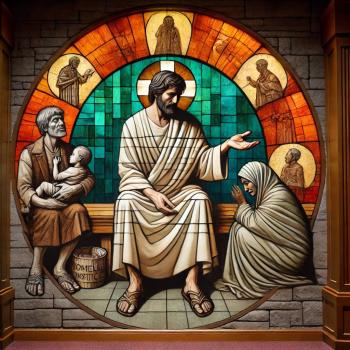Although purely anecdotal, I remember witnessing a strange dynamic in my fundamentalist/evangelical days as to decision making. While our church had a democratic/congregational type polity, there was always an undercurrent of potential pastor idolization and the authoritarian temptation or impulse.
It mostly depended upon how well liked and respected the pastor was by those with the most power and influence (often those with the most money—the substantive tithers) in the church. If for some reason the pastor fell out of their good graces, they would use their power to build a majority consensus against him to try and force a resignation.
However, if those with the most influence and power liked and respected the pastor, often almost to the point of idolization, he was often given a blank check as to authority and direction. The democratic consensus normally in play was often brushed aside. If even a sizable group within the church were to challenge the pastor, raise prickly questions, or be critical, they were often accused of daring to touch “God’s anointed.” These things didn’t normally end well.
Looking back, it was almost as if the church wanted a democratic/congregational type polity simply to be able to get rid of any pastors they found wanting, sort of a back-up escape route if things weren’t working out. Conversely, what was really hoped for was finding a person they could almost see as a king over them. Someone so anointed of God, so wise, so spiritual, and so intelligent they really could trust this person to take the reins and lead in a benevolent authoritarian fashion.
I know this is only my experience and perspective, but I have to believe this dynamic played out in many similar type churches throughout my time in that world (1970s-early 2000s). Indeed, isn’t this dynamic evident as to the many scandals within the fundamentalist/evangelical world when it comes to “fallen” pastors/leaders?
Relatedly, I often remember a phrase thrown around when people would talk about minority/majority decision making: “God plus one is a majority.” It was often bandied about when it was learned some new law had passed in which the law or decision was thought to be against the Bible or what God had commanded. It didn’t matter to them that the decision/law had come about through a democratic or consensus type process. If God plus only one person was against the law/decision, then they were in the right: the majority be damned.
Regardless what one thinks of that type of reasoning (and in some cases, I think it true—for instance as to the once legality of slavery), one can also hopefully see the authoritarian temptation as well. Majorities can be wrong. The counter though is to build a larger consensus that can hopefully match and even become a larger majority to then try and change what we believe the previous majority had wrong. Such isn’t as easy when it’s not a majority of people we are trying to counter, but a single authoritarian who has been granted way too much power.
Fundamentalists and even too many evangelicals have a political sensibility that runs along the lines of a king, his kingdom, and subjects. They take their view of the Kingdom of God, with Jesus as King of kings, and think about earthly polity with that framework in mind as the ideal.
Of course, when we think about the Puritans, the early American colonists, and the American Revolution, we think the opposite—that our tradition, history, and culture are the very rejection of kings and subjects or of a single authoritarian power. Well, yes and no (more about that in a moment).
I have a theory though. I think the same dynamic is at play in our national mindset (at the popular level anyway) as to democracy and majority consensus, as was noted to be in play in our fundamentalist and evangelical churches, which still make up a large majority of the churched in America.
And this mindset is that democracy and the majority consensus is something we tolerate as long as things seem to be going our way. However, if someone comes along who is charismatic, strong, and is “God’s man/woman,” or the ideal “king/queen” if you will, then all bets are off. We will begin to downplay majority rule and the democratic process and elevate the idea of the benevolent king/queen, the one ruler who can bring a sense of order, law, and peace to his nation/country.
If one doesn’t think this possible or believe it, where have they been the last 5 years? Under a rock? The simple truth is that a great deal of fundamentalist and evangelical Christians were willing to overturn (even violently) a legitimate election to keep the person they wanted as “king” in office. We had the evidence right before our very eyes on January 6th. And even if one was not in Washington on that day, from the comfort of their homes, too many Christians were still sympathetic to those ends.
Ironically, it was no less an evangelical, Os Guinness, who pointed out the danger of the authoritarian temptation amongst his brethren back in 1993. In this book, see his chapter entitled, “Apple Pie Authoritarianism.” I’m not asserting anything novel here. In fact, the authoritarian temptation has been noted extensively of late, see here, here, and here.
My point is that for all the supposed fidelity to democratic polity, reflected in congregational polity, such was often only tolerated if we felt we were for the most part getting our way and liked our leaders. Once the pastor came along that we felt could almost walk on water, or a “Lord Protector” like Cromwell who would defend us violently if necessary, then we were all in. In those moments, democracy began to fade in importance.
The cry of God’s people, stretching back to ancient times, has too often been, “Give us a king to rule over us.” It seems to be the perennial temptation. It waxes and wanes throughout history. At times, it is more prominent than others–sometimes it sleeps and is only latent.
I fear however that such is no longer the case. Once again, that sleeping dragon has awakened. Perhaps it was summoned by the rhetoric, the simple-minded and ignorant incantations, or whatever it is that passes for “commentary” these days on cable news (Fox especially) and social media.
I also fear we are in place where the Puritans found themselves before leaving England for the new world. Evangelicals, more and more, are no longer identifying with large parts of the American community. I don’t mean in the sense of noting we are exiles and citizens of heaven first, no matter our home country. No, I mean in a shared sense of history, culture, and community, even in disagreement. I mean that love of home and community that can encompass differing views peacefully.
Gilbert Meilaender, a contributor to this book, addresses this in his treatment of political theorist Michael Walzer’s work:
“[The Puritans] no longer thought of themselves fully as members of that order in England. They thought of their prophetic role in Calvinist terms as a public office to which God had called them. This could, of course, only be the status of an outsider, one no longer ‘connected’ to the older order…The old order was, according to the [Puritans], deeply entrenched in Satan’s control. Believing this, these saints-in-exile found themselves having ‘virtually no social connections or sympathies for it.’ Ties of personal loyalty or friendship could not be important; what counted was the impersonal loyalty shared by those with similar divine callings. And lacking any real sense of connection with the older England they criticized, they felt little need for ‘limits’ in their criticism of it (or later in their war upon it) … ‘This was an army capable of making war ruthlessly, because it had nothing but contempt for the world in which it moved.’
Walzer is drawn to these Puritan saints because of their public spiritedness, a quality to which he is deeply committed, but he is also dissatisfied with them as social critics…[he notes a “alienated” “unattached” social criticism that is moral not epistemological] After all, the Puritan radicals may have appealed to a special truth, but they still shared a common language and tradition with the old order. What they wanted to assert was not unintelligible to the society they had left; it was simply dangerous. In saying that their lack of connection was not epistemological but moral I mean to capture something of what it means to be a disconnected critic in Walzer’s sense. Their failing was that they did not love that which they criticized and sought to change. They were unable to be apart and united.” (Pgs. 49-50)
At this point, as to that segment of the evangelical that supported Trump, the January 6th insurrection and coup attempt, and who continue to demonize their political opponents, they fail in the exact same way as their Puritan forefathers.
And this same failure is at play in our present moment and is a key aspect to the authoritarian temptation. If there was ever a time for vigilance, it is now.
I have a Patreon—please consider supporting my writing.

















